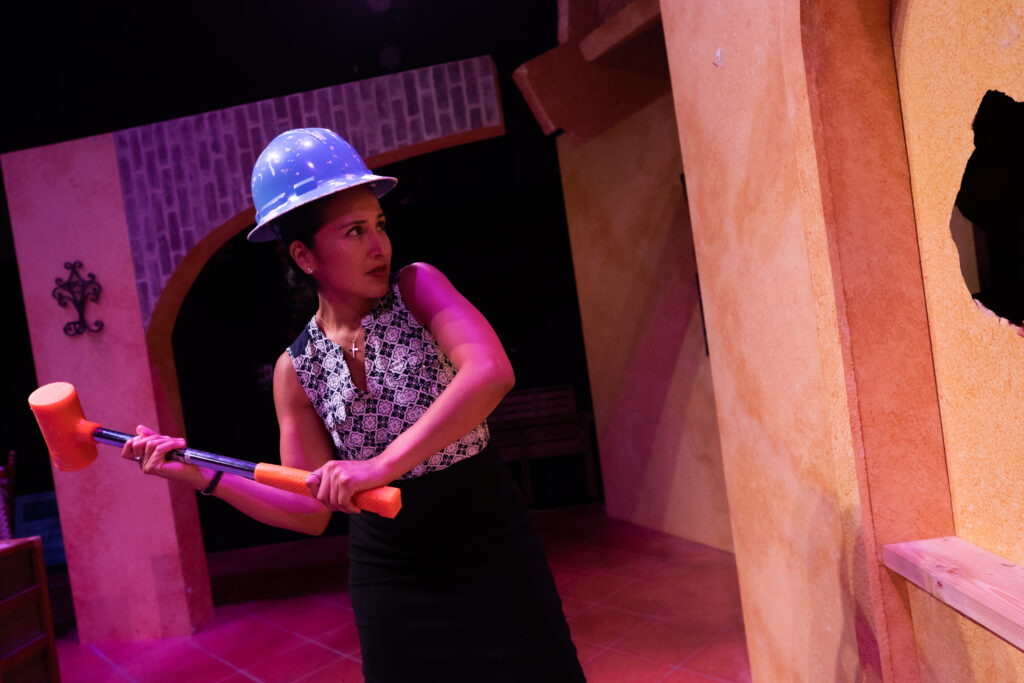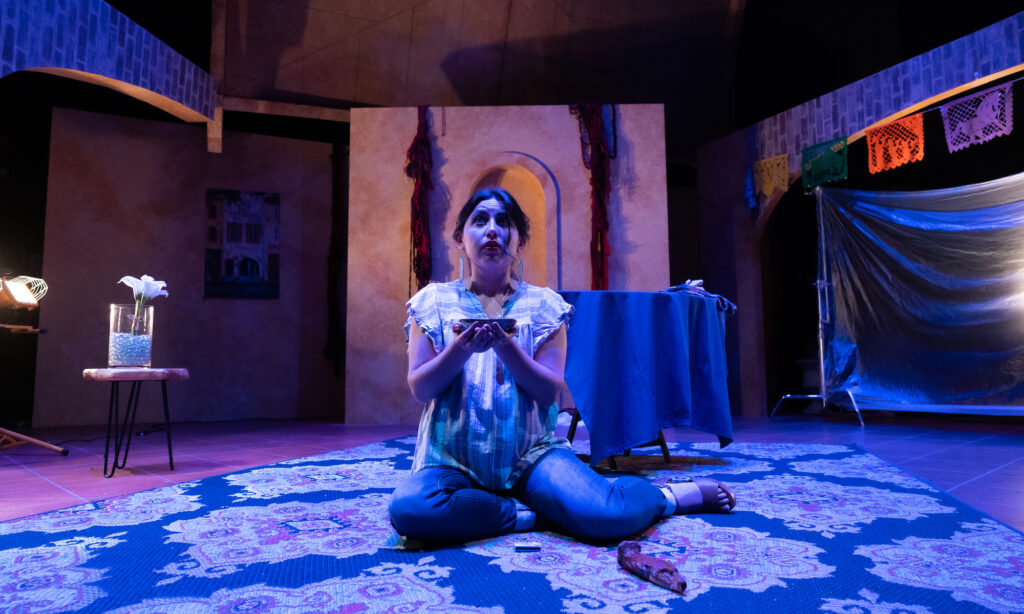Though not explicitly mentioning COVID, Shotgun Players announced their third show of the season would postpone from its July 16 opening due to “unforeseen circumstances”. When opening night finally arrived on July 23, their vaccine check appeared to this reviewer to remain the same (no check for boosters). Like the Aurora Theatre, Shotgun’s website boasts of its new ventilation system (Reme HALO-LED) at the Ashby Stage, meant in to combat the spread. Yet, just like Aurora, my Aranet4 picked up some unsettling CO² readings: between 583ppm and 2,340ppm by the final bow.
As such, it really resonated with me when the characters of Eliana Pipes’ Dream Hou$e (through August 14 at the Ashby Stage, Berkeley) are shocked to hear that their childhood home may be full of mold they never knew was there.
Granted, that’s the least of the worries for Patricia (Elena Estér) and Julia Castillo (Linda Maria Girón) as they ponder selling their childhood home after their mother’s passing. Patricia, a former corporate accountant-turned-independent, decides to forego the usual Redfin and Zillow routes to instead get the show featured on the gaudy basic-cable show Flip It and List It, hosted by the very Stepford-esque Tessa Westbrooke (Libby Oberlin).
Tessa and her silent, omnipresent film crew dangle the promise of flipping the century-old SoCal house to sell for a fat price tag after it’s been demolished—nay, renovated. Despite this juicy possibility, Julia—a six-month pregnant social studies teacher—is reluctant to part with the place where she grew up, built by their great-great-grand-father.

From that premise, you’d expect a fairly straightforward, well-told tale of “greedy profiteers vs. compassionate broke folks” that’s driven stories as renowned as The Blues Brothers, *batteries not included, and Breakin’ 2: Electric Boogaloo. Fortunately, Pipes’ dramedy is at its best when it reveals its central duo as neither black nor white, but morally gray. Patricia—who pronounces her name with an American-English accent—cared for the duo’s mother up to the moment of her death, often having to deal with the old woman’s inability to clean herself anymore. She’s ready to off-load the house something of a “reward” for all the time and effort she put in.
Contrarily, Julia—pronounced with a Spanish accent—doesn’t want to see another Latinx-owned property sold off to faceless investors who’ve already bought out most of the neighborhood. It’s the very sort of house she could easily imagine raising her child in. But she hasn’t been in the house for years, not even returning to help Patricia as their mother’s condition worsened. When the cameras roll, she leans into her Latina identity as heavily as Patricia (whose name pronunciation also changes, depending on the speaker) leans away from it—so as to attract, in her words, a “different level” of buyer.
Also, the sisters have a supernatural ability to stop time, like the half-alien girl from the ‘80s show Out of this World. They use this ability to have many asides where they air their feelings to one another.
That, along with showing Tessa as some near-demonic game show host (think HGTV if the “h” stood for “Hell”) are the strengths of the script. Each sister has her valid points, but neither really has the moral high ground. Patricia (whom Estér plays with an icy determination that slowly melts away to reveal a sad sense of insecurity) is an unabashed neo-liberal in the Jay-Z sense—if you’ve ever heard his “Moment of Clarity” or recall Harry Belafonte’s critique of him and Beyoncé, you know what I mean. She feels that selling out isn’t so bad if you get a high price. Girón brings, for lack of a better term, a proud naïveté to Julia, who uses her social studies knowledge to stress the importance of maintaining a connection to history, but she knows shockingly little about her family, other than conjecture. This is all good.

Where the script falters is in a great deal of its dialogue. Pipes’ words can often have a “college playwright”-level of exposition to them, telling audience members what we can obviously see. A scene in which Julia lights a candle and prays to the ancestors in silence works a million times better than the scenes in which she and Julia seem to be vocalizing “Gentrification 101” for us. Also, Pipes clearly wanted to end on a note of ambiguity, but the script stumbles as it nears the end. By now, the sisters have argued, reminisced, and jumped through many of Tessa’s hoops—including a Newlywed Game-style Q&A of one another—in the hopes of getting a high price for the house.
But this is when all of Pipes’ messages and intentions begin to clash into one another like a sledgehammer to Carlos Aceves’s beautiful pueblo-style set. She never resolves the supernatural elements with the social commentary and moral ambiguity. It’s one thing to hope the audience understands your complexity, it’s another to clearly have no conclusion for the thesis you’ve drawn up. The play doesn’t end so much as it stops.
Pipes’ script is representative of a fertile mind, but feels like a dish served before it was finished cooking. Under the assured direction of Karina Gutiérrez and her design crew, the cast (including a fun, scenery-chewing turn by Oberlin as Tessa) inject a lot life and pathos into the text, which makes it all the more frustrating that it isn’t seen to an appropriate end. It’s a story about two BIPoC characters struggling with how the world sees them and how they see each other, but it ends with too much navel-gazing. To their credit: it’s hard to take your eyes of them when they’re in their zone.
It’s certainly more reassuring than looking down at your own air circulation monitor.
DREAM HOU$E runs through August 14 at the Ashby Stage, Berkeley, and will be offered via video-on-demand August 10–21. Tickets and info here.






